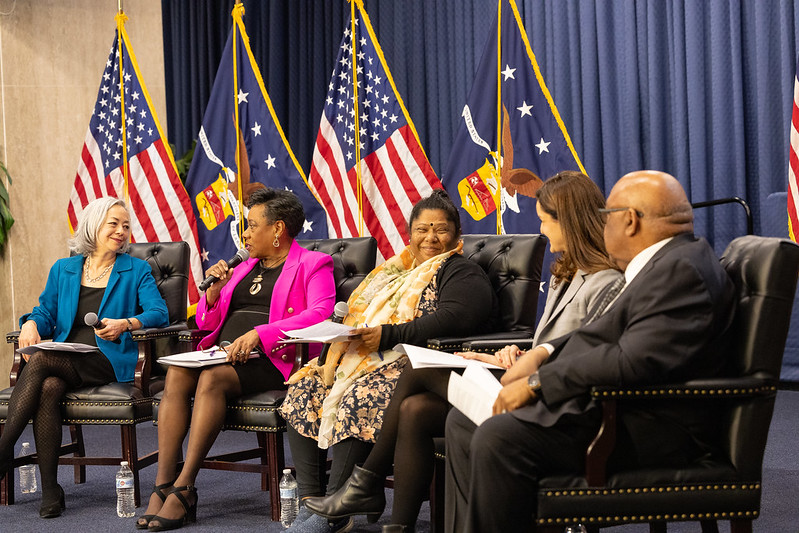
Mar 29, 2023
On the eve of the Summit for Democracy, high-level U.S. government officials and domestic and international labor activists highlighted the fundamental role of trade unions to reinforce, expand and protect democracy around the world at an official summit side event.
The event Tuesday, March 28, “No Democracy Without Unions: Labor Movements as Defenders of Democratic Rights,” featured Kalpona Akter, executive director of the Bangladesh Center for Workers Solidarity; Fred Redmond, AFL-CIO secretary-treasurer, president of the Trade Union Confederation of the Americas and a Solidarity Center board member; Becky Pringle, president of the National Education Association; Kelly Fay Rodriguez, State Department special representative for labor affairs; and video messages from Maung Maung, president of the Confederation of Trade Unions-Myanmar, and Lizaveta Merliak, leader of Salidarnast, an association of exiled Belarus labor unionists. The event was co-hosted by the U.S. Department of Labor, U.S. Department of State and U.S. Agency for International Development.
State Department Under Secretary for Civilian Security, Democracy and Human Rights Uzra Zeya opened the event by underscoring “unions’ unique and critical contributions to democratic societies.” She emphasized the dangers faced by labor activists fighting for basic rights, including Chhim Sithar, a Cambodian union leader imprisoned for her organizing work, and the Belarussian union leaders recently sentenced to lengthy prison terms for exercising their fundamental right to freedom of association and assembly. “These cases are emblematic of closing space for civil society champions writ large around the world,” she said.
Deputy Undersecretary for International Affairs at the U.S. Department of Labor Thea Lee, event moderator, concurred. “Governments that cannot tolerate democracy, cannot tolerate criticism are the most vicious in silencing worker movements,” she said.
“The fact the authoritarian regimes have tried to silence activists like Maung Maung and Lizaveta only underscores their leadership as champions of democracy and democratic values,” Lee added. “Democratic, grassroots workers movements threaten dictatorship.”
Indeed, worker movements have brought down dictatorships. Fred Redmond cited the example of Brazil, where labor led a mass civil society movement—including key strikes in the 1970s—and helped return democracy to the country and where, at the beginning of this century, the administrations of President Luiz Inácio “Lula” da Silva and President Dilma Rousseff—both former labor leaders—helped lift 40 million Brazilians out of poverty.
“The survival of democracy anywhere depends on working people defending it,” said Redmond.
The entire session can be viewed here. Solidarity Center Executive Director Shawna Bader-Blau spoke at a separate Summit for Democracy side event at the Center for Strategic and International Studies (CSIS), which can be viewed here.
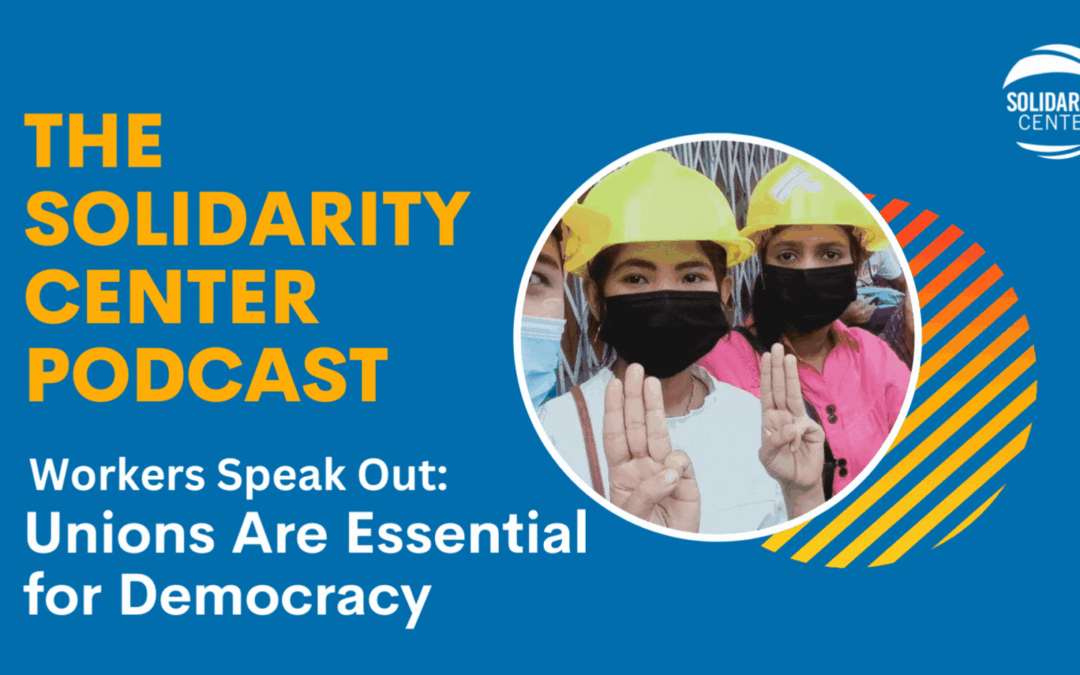
Mar 29, 2023
Workers from around the world, including those exiled from Belarus, Eswatini and Myanmar for forming unions, striking and trying to speak freely, describe why democracy is important—and why unions are key to democracy—in a special episode of The Solidarity Center Podcast.
This week, high-level policy makers, including U.S. Vice President Kamala Harris, are gathering for Summit on Democracy events in Washington, D.C., and in Zambia, where the spotlight will be on how to amplify worker voices to safeguard democracy in Africa and globally. (Register for an official Summit side event in Zambia focused on worker rights.)
“Workers know the importance of unions to democracy—and what democracy means in their lives,” says Solidarity Center Executive Director and Podcast host Shawna Bader-Blau. “The union movement is the strongest voice for democracy.”
One of the workers the episode highlights is Lizaveta Merliak, a union leader exiled from Belarus, who speaks out from Germany, where she and other union leaders were forced into exile.
“I’m one of a few trade unionists who escaped from Belarus after the liquidation and repression of democratic trade unions—unlike my comrades, leaders, and activists of democratic trade unions who are jailed and tortured in prisons.
“We must support the aspirations for democracy in every way we can and, at the same time, preserve and develop the idea of grassroots democracy at workplace. We will revive the independent trade union movement in Belarus, with the aim of creating a democratic society based on the principles of justice and decent work.”
Listen to the full episode here.
Follow the Summit for Democracy events on Twitter @SolidarityCntr and on Facebook at Solidarity Center.
DOWNLOAD RECENT EPISODES!
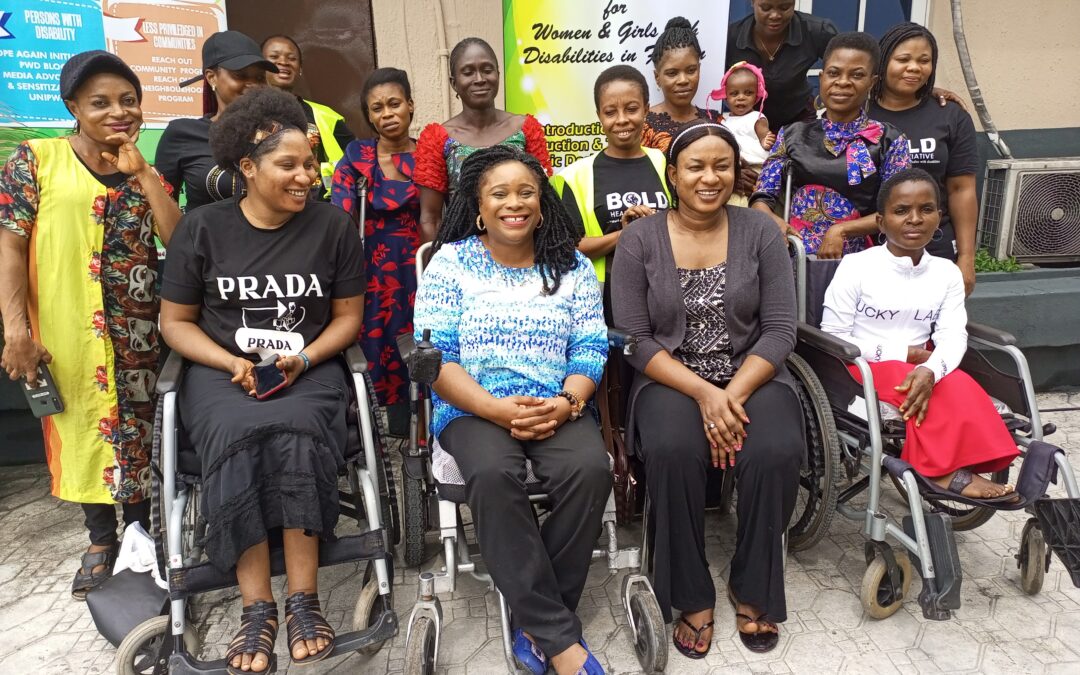
Mar 27, 2023
A survey of more than 600 workers with disabilities in Nigeria’s formal and informal sectors, conducted by the Trade Union Congress of Nigeria (TUC) Women Commission and the Solidarity Center in collaboration with Nigerian unions and disability rights organizations, finds that most workers with disabilities cannot access decent work as defined by the UN International Labor Organization (ILO).
“It provides evidence for what we have been saying for so long [and is] a powerful tool for advocacy,” says Nigeria disability advocate and FAECARE Foundation Executive Director Ndifreke (Freky) Andrew-Essien.”
“Securing Equal Access to Decent Work in Nigeria: A Report by Workers with Disabilities,” reports quantitative data collected from 322 men and 338 women workers with disabilities across seven geopolitical zones and the Federal Capital Territory in Nigeria, supported by qualitative data collected from union members. The study—for its sample size and breadth, as well as for the collaboration between trade unions and disability rights organizations—is the first of its kind. An estimated 1 billion people experience disability worldwide, the majority in developing countries. According to the World Health Organization’s 2011 World Report on Disability, between 25 million and 27 million people experience a disability in Nigeria, the majority of whom live below the poverty line. Indeed, disability, and low socioeconomic status interact to keep people in poverty.
The survey found that, regardless of legislation aimed at addressing diversity in the Nigerian workplace, disabled workers do not experience the same access to employment opportunities as their counterparts without disabilities and often face physical, social, economic and/or environmental barriers to participation.
Findings and Recommendations
Most of the 660 workers surveyed are self-employed and in the informal sector. Almost half of respondents earn less than Nigeria’s minimum wage and say their work environment is not accommodating to their disability. Most (62 percent) cite transportation as the most significant obstacle to accessing work, followed by a lack of disability-friendly facilities (33 percent) and poor communication with or unsupportive co-workers (19 percent). Nearly a quarter of disabled workers say they work more than eight hours without overtime pay. A similar number had experienced violence or harassment (GBVH) during the previous two years.
Researchers conclude that a variety of actions—by the Nigerian government, employers and unions—could build an inclusive working environment that respects, includes and accommodates disabled workers. This includes the revision of laws to outline reasonable accommodations in employment and the creation of a disability tax fund to provide adequate social security benefits. In addition, unions, along with disabled workers, should work together to demand reasonable accommodations at work and greater accessibility.
The ILO defines decent work as work that is available to all equally, is productive and delivers a fair income and security in the workplace, provides equal access to social protections—such as pensions, and adequate and affordable healthcare—and affords workers freedom to participate equally in decisions affecting their work lives.
Download a summary booklet here.
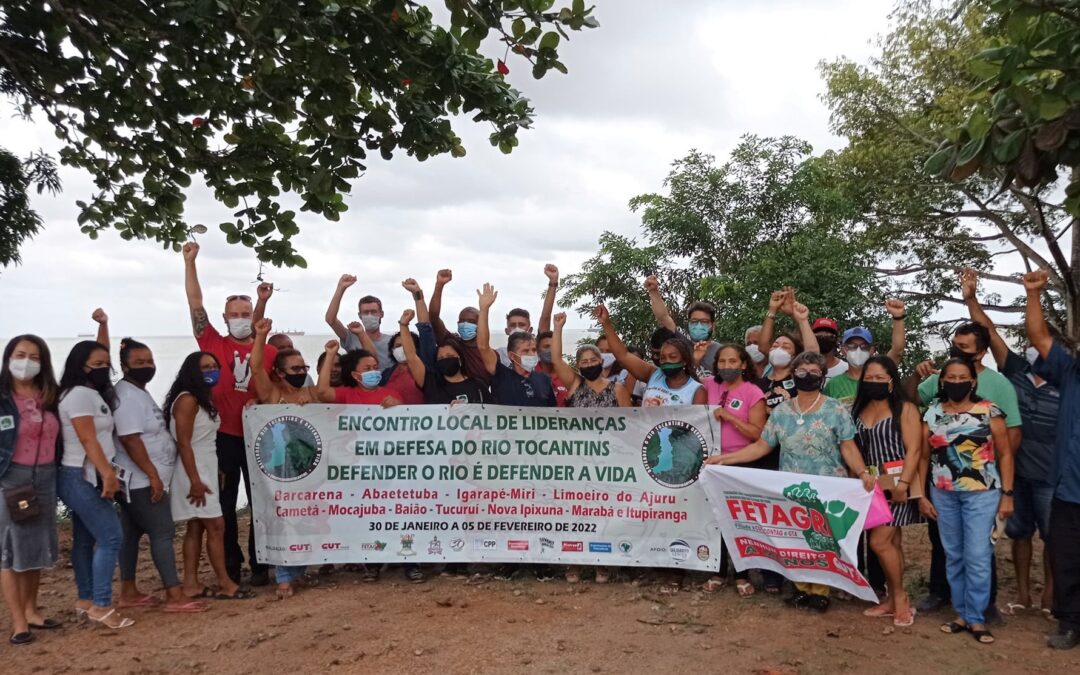
Mar 23, 2023
Brazilian communities along a river near the Amazon are celebrating the government’s decision to halt a blasting and dredging project that could destroy their livelihoods and severely damage the environment. Earlier this month, the Public Prosecutor’s Office recommended that the Brazilian Institute of the Environment and Renewable Natural Resources (IBAMA) suspend its preliminary license for the Araguaia-Tocantins waterway project in the state of Pará.
In suspending the license, the government cited the absence of prior consultation with residents who would be impacted, especially Indigenous communities and quilombolas, and the lack of information on the effects of the project on the communities.
The victory “has impacts not just for the local community, but also for the state and even further,” says Carmen Foro, speaking through an interpreter. Foro, a rural activist from the area, is former secretary-general of the Unity Worker Center in Brazil (CUT). “I feel that I and other community members are being heard, that we have opened a dialogue that this project can’t happen without our participation.” (Foro described her community’s fight for survival in a Solidarity Center Podcast episode last year.)
The project would have involved heavy dredging of the Tocantins River and require removing miles of the rocky Pedral do Lourenço river bed to increase navigability during the dry season and facilitate commodity export. IBAMA approved the preliminary license to begin the project in October 2022, ignoring several government agency recommendations.
Key to Success: Mobilizing a Diverse Coalition
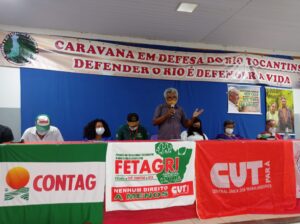
Members of the Caravan in Defense of the River Tocantins meet with residents of Nova Ipixuna to discuss a proposed waterway project that threatened livelihoods and the environment. Credit: Amazon Community
“This time in world history, it is really important to connect to the diversity around us,” Foro said. The campaign was victorious because “we created a grand alliance between the unions and with other movements, like quilombos, the Catholic Church, young people, women, fishers. And that alliance is what gave us strength.
“It was a collective struggle.”
These diverse groups, with support from the Solidarity Center, formed the Caravan in Defense of the Tocantins River to raise awareness about the negative impacts of the waterway construction and demand that the government honor international treaties respecting Indigenous and Tribal People’s right to safeguard and manage the natural resources on their lands. They reached thousands of people, through riverside meetings and in online forums.
With its strength in workers’ collective voice, the Brazilian labor movement was well-positioned to respond to the needs of workers and their communities, including the impact of climate change and environmental degradation on jobs and communities. “The unions in those cities are kind of seen as the principal organization in the social movements,” she said. “Along with the CUT, they were able to be an umbrella organization and give us support.”
The Struggle for Democracy Cannot Rest
Foro, who recently was selected by the new administration of President Luiz Inácio “Lula” da Silva to serve in the Ministry of Women, says “many women will be impacted by this project, and through my role now at the Ministry of Women, I plan to be alongside the women who are going to be impacted by this project.”
The license suspension is a huge victory, but the process is not over. “Everyone knows that this recommendation doesn’t resolve the issue,” she says. “The problem is still there and it will be a long journey. There still will be something in the middle between this recommendation.”
While she is hopeful about working with the new administration, whose election with the support of union and community groups opened dialogue with historically marginalized communities along the Amazon, Foro is keenly aware they must work to ensure the democratic process thrives.
“It’s important that we continue the fight, continue the struggle. Even with a democratically elected government that is representative now, there is still pressure that is coming from all different sides. The workers are part of that, but also there is the pressure from large companies, and agro-business as well. We have to continue to fight.”
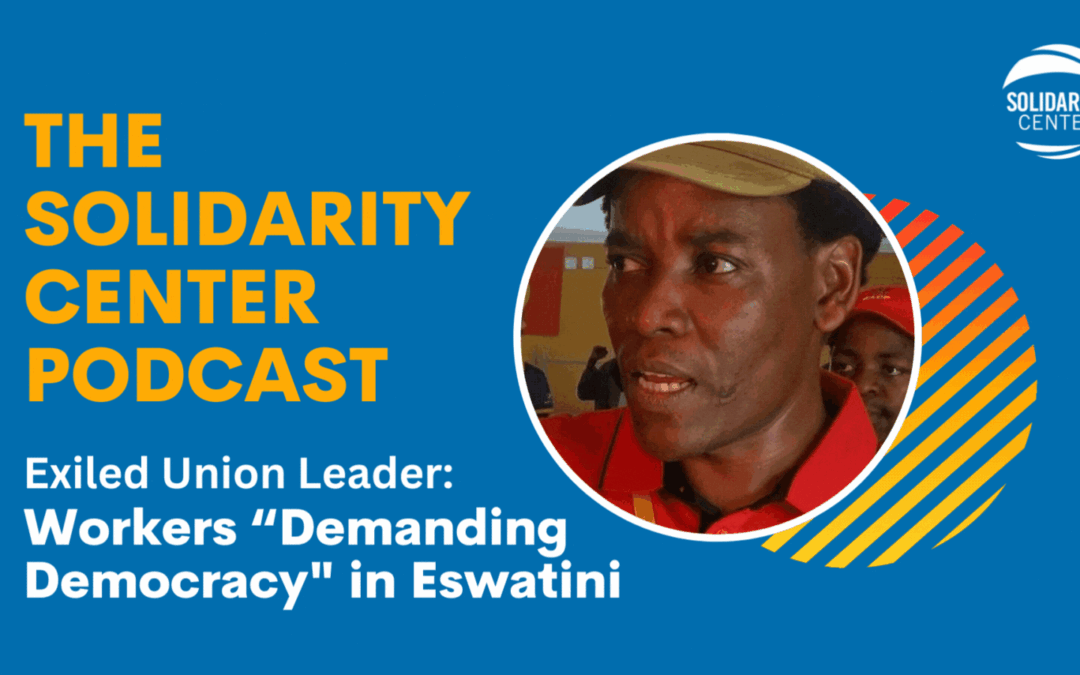
Mar 16, 2023
In Eswatini, a landlocked country in southern Africa, union workers are routinely harassed, attacked and even killed for going on strike or holding rallies. In 2021, dozens of workers were killed by security forces in what Amnesty International called “a full-frontal assault on human rights” by the government in response to ongoing pro-democracy protests. In January, prominent human rights lawyer Thulani Maseko was shot dead, hours after a speech by the king warning those calling for democratic reforms that mercenaries would deal with them.

Exiled SWATCAWU leader Sticks Nkambule is receiving support from SCAWU and other unions in Eswatini. Credit: SCAWU
Most recently, Sticks Nkambule, general secretary of the Swaziland Transport, Communication and Allied Workers Union (SWATCAWU), was targeted by the government for leading a strike to improve working conditions. Forced to flee Eswatini, formerly called Swaziland, Nkambule described the interconnected struggle for worker rights, human rights and democracy on the latest Solidarity Center Podcast.
“We are just demanding the basics of what could be defined as democracy. A government that is formed by the people and serving their interests,” Nkambule told Podcast host and Solidarity Center Executive Director Shawna Bader-Blau.
“By bringing together the collective voice of all workers, unions fight for decent working conditions but also for the freedoms fundamental to all democratic societies,” Bader-Blau told Nkambule.
Despite the brutality and repression, Nkambule finds hope in the support from labor and human rights organizations around the world—and in workers themselves.
“What is quite inspiring is that the people of Swaziland are determined to be part of the conversation that is going to change their discourse. It is a reality, activists and, not just labor, beyond labor.”
Listen to this episode and all Solidarity Center episodes here or at Spotify, Amazon, Stitcher, or wherever you subscribe to your favorite podcasts.
Download Recent Episodes!
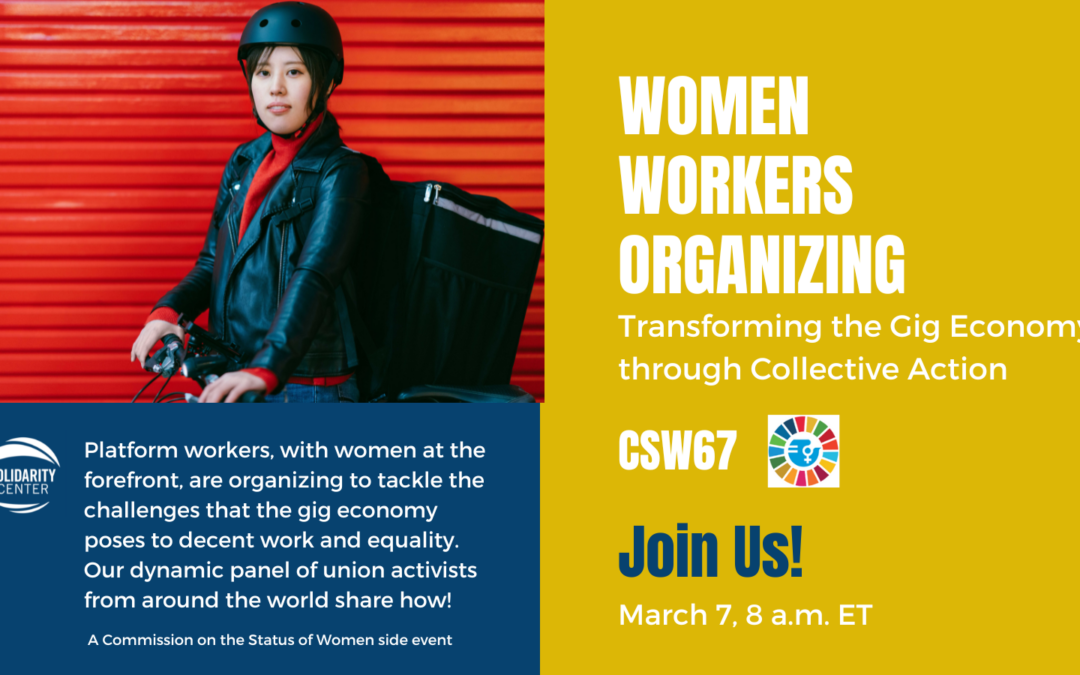
Mar 8, 2023
App-based drivers worldwide work long hours for often minimum wages while facing safety risks every day—and these issues are compounded for women platform workers, according to speakers at a Commission on the Status of Women (#CSW67) side event, Women Workers Organizing: Transforming the Gig Economy through Collective Action.
“Not just in Colombia, but worldwide, women are always the ones that are the most vulnerable and paid the worst,” said Luz Myriam Fique Cardenas, president of Unión de Trabajadores de Plataformas (UNIDAPP) in Colombia. “We suffer harassment. We don’t have security in the streets because we’re women.”
Cardenas joined three women app-based drivers from Kyrgyzstan, Nigeria and the Philippines who are mobilizing platform workers to form unions and stand up for their rights. The March 7 Solidarity Center panel, spearheaded by the organization’s Equality and Inclusion Department, was co-sponsored by the International Trade Union Confederation (ITUC).
Although most countries have hard-won labor laws in place, app-based workers are among 2 billion informal sector workers with few legal protections. Women platform workers experience sexual harassment and other forms of violence on the job along with the risks of injuries from traffic accidents, yet the multimillion dollar companies employing them provide no workplace injury or health coverage.
In Nigeria, where one app-based driver is killed each month, “you are your own security. Every trip you go on, you are at risk,” said Ayobami Lawal, an app-based driver, business graduate and mother of three. Earlier this year, Lawal and other drivers in Nigeria won the country’s first union covering platform-based workers, the Amalgamated Union of App-Based Transport Workers of Nigeria (AUATWN). (Nigerian platform drivers’ campaign for rights on the job is highlighted in this Solidarity Center video, part of the panel presentation.)
“Taxi drivers are seen as informal employees and we have no protections whatsoever,” says Gulmayram Batirbekova, a platform taxi driver in Kyrgyzstan. A single mother of five, she has become an active leader in Kabylan, a platform worker union she says is named after an animal “that is fiercely independent, a leader.”
“Our main effort now is to become recognized as employees so we are entitled to all the protections enshrined in the law, to make sure we make enough money for ourselves and our children.” (Kyrgyz platform drivers’ campaign for rights on the job is highlighted in this Solidarity Center video.)
On the Frontlines of a Tech-Driven Revolution
Hearing from each others’ struggles, panel participants noted the similarities of their experiences trying to support themselves while working within an exploitative employment model that updates what panel moderator Emily Paulin called the “grinding nature” of the work in the industrial revolution.
“You are on the front lines of shifting this tech-driven industrial revolution to shift the perspective that working 14,16 or even 18 hours is even remotely appropriate for us in the 21st century,” said Paulin, Solidarity Center senior organizational development and labor education specialist.
While mobilizing to form unions, platform workers also are pushing for legislation and changes to labor laws in their countries, urging lawmakers to ensure app-based workers have the same rights and protections guaranteed by international law for all workers. Some, such as in Nigeria, are filing class-action lawsuits against platform companies for wage theft and other worker abuses—all part of broad-based campaigns to achieve workplace dignity and respect.
Company Calls the Shots—but Doesn’t Call Them ‘Employees’
Throughout their discussion, panelists homed in on two areas: classification of app-based workers as “independent contractors”—meaning platform companies are not required to follow labor laws such as ensuring a minimum wage and providing basic health and safety coverage—and the lack of transparency and unpredictability of algorithm-based employment.
Whether the companies are global, such as Uber or Glovo, or regionally based, like Deliveroo and Yandex, their business models are the same: Maximize profit by moving operating costs onto workers by calling them independent contractors.
Panelists cited a long list of company requirements they must fulfill to keep their jobs—demonstrating the extent to which they are employees of platform companies and not independent contractors. For instance in the Philippines, where Mary Rose Evardone is a delivery driver for GRAB, the company “has denied we work for them, but they have full control on us. First and foremost they can control the fare. Grab can make it higher or lower anytime.
“Wearing a uniform and bag with Grab logo is compulsory—you need to do that to be identified as a Grab rider,” she said, noting that the company deducts the uniform and bag expenses each month from their paychecks.”
Evardone, a union leader and organizer with the United Delivery Riders of the Philippines (RIDERS-SENTRO) and single mother of five, says she was suspended from the app for organizing her co-workers but has been reinstated while waiting for a court decision on her firing. RIDERS-SENTRO has organized workers in four chapters across several Philippines islands.
Said Batirbekova: “They tell us what to do and we must do that but they won’t give us anything in return. For instance, if we reject a fare, we are blacklisted. When they block your account they do not give you the details, they just lock you down. For you to re-open the account and get reinstated is a real struggle.”
“The fact that we are not recognized as employees is the problem.”
An Algorithm Boss
Not only are app-based drivers directed by employers, the “employer” directing them minute-by-minute is an algorithm.
“Companies want to make everyone think, and even the government think, the algorithms are independent. We all know there is someone programming these conditions and this affects us. Why? Because they’re giving us orders constantly through the algorithm,” says Cardenas.
“It affects women because we often have to accept trips to risky areas. They don’t give us the address where we are going. After we accept the trip we realize we are going to a risky area and we have to go or otherwise we will be blocked.”
Cardenas and others described the unrelenting demands of the algorithms that “make all the decisions on our orders, the distance, but us drivers don’t have any opportunities to choose the order or to assign a value to that order. The algorithm decides on temporary or permanent blocks on drivers. These temporary blocks can last hours or days and don’t allow us to work so we can’t generate income.”
Says Lawal: “We have increase in oil prices, it doesn’t change our fare. We have increases food, it doesn’t change our fare.”
But working through their unions, panelists were optimistic they are improving work for all app-based drivers. “I am sure that this union we have now will be able to talk about this so we all can have a good working environment,” said Lawal.
“Without us, they can’t be an app company. Without drivers, the company won’t function.”
Part of the United Nations, the CSW is the main global intergovernmental body exclusively dedicated to the promotion of equality and the empowerment of women. This session’s focus is Innovation and Technological Change Education in the Digital Era for achieving equality and the empowerment of all women and girls.








